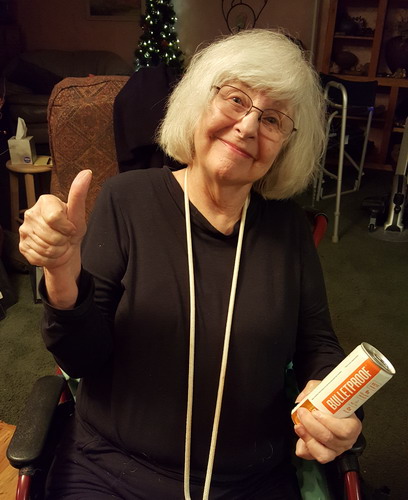A couple of weeks ago I was listening to an interview of David Asprey by Dr. Mercola. They were discussing fasting protocols and the use of 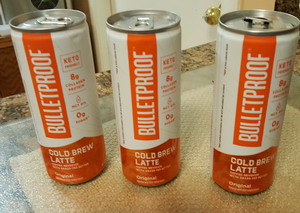 exogenous ketones to support the fasting state. This piqued my interest as anything that enhances the fasting experience and makes it easier is a good thing. In
this case, the exogenous ketones being discussed was the use of MCT oil, specifically the caprylic acid (C8) and capric acid (C10) portions, as used in David's product Bulletproof coffee. Both of these medium-chain fats are able to bypass the liver and be used directly in the cells for energy.
exogenous ketones to support the fasting state. This piqued my interest as anything that enhances the fasting experience and makes it easier is a good thing. In
this case, the exogenous ketones being discussed was the use of MCT oil, specifically the caprylic acid (C8) and capric acid (C10) portions, as used in David's product Bulletproof coffee. Both of these medium-chain fats are able to bypass the liver and be used directly in the cells for energy.
Why is this important? This is hugely beneficial because it allows people who are not in ketosis or fasting to experience the benefits of ketone energy without having to do dietary ketosis. Ketone energy is far superior for most parts of the body, but especially the brain. Alzheimer's disease has been called type 3 diabetes because the brain has its own control of 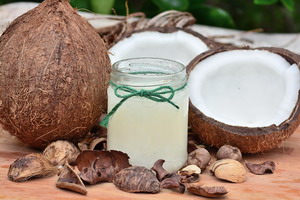 sugar utilization separate from the rest of the body. Your body may have plenty of sugar for energy, yet with Alzheimer's disease, the brain is literally starving for energy. Ketones are not part of this energy system and bypass this type 3 diabetes situation. They directly provide the brain with the energy it needs via a different energy pathway. This was big news a few
years ago when a nurse discovered that feeding her Alzheimer's husband tons of coconut oil reversed his Alzheimer's as long as she kept feeding him it. We now know that it was not simply the coconut oil, but the capric and caprylic acids in the coconut oil that were doing the job. Coconut oil is about 7% capric and 7% caprylic acid. Most of the coconut oil does not have this benefit, just this small portion. It is much easier to get down a few teaspoons of the right
stuff than a whole cup of coconut oil to do the same job.
sugar utilization separate from the rest of the body. Your body may have plenty of sugar for energy, yet with Alzheimer's disease, the brain is literally starving for energy. Ketones are not part of this energy system and bypass this type 3 diabetes situation. They directly provide the brain with the energy it needs via a different energy pathway. This was big news a few
years ago when a nurse discovered that feeding her Alzheimer's husband tons of coconut oil reversed his Alzheimer's as long as she kept feeding him it. We now know that it was not simply the coconut oil, but the capric and caprylic acids in the coconut oil that were doing the job. Coconut oil is about 7% capric and 7% caprylic acid. Most of the coconut oil does not have this benefit, just this small portion. It is much easier to get down a few teaspoons of the right
stuff than a whole cup of coconut oil to do the same job.
Energy deficits in the brain are common in many situations other than Alzheimer's. Without sufficient energy, your brain can not manufacture the neurotransmitters it needs for proper functioning. Symptoms might be anything from feeling foggy-headed, poor memory, unable to relax, lack of  happiness, to
difficulty processing information and thinking straight. These same symptoms can also come from brain inflammation due to a number of causes like a concussion, restricted blood flow, or toxicity. All of these affect the ability of the brain to generate energy for normal functioning. The illuminating reality is that the brain runs better on ketones than it does sugar (glucose) because ketones don't produce nearly the number of inflammatory free radicals that sugar burning
does. Ketones are like power plants burning natural gas compared to plants burning coal for sugar. Sugar simply makes lots more pollution when it burns and is converted into cellular energy.
happiness, to
difficulty processing information and thinking straight. These same symptoms can also come from brain inflammation due to a number of causes like a concussion, restricted blood flow, or toxicity. All of these affect the ability of the brain to generate energy for normal functioning. The illuminating reality is that the brain runs better on ketones than it does sugar (glucose) because ketones don't produce nearly the number of inflammatory free radicals that sugar burning
does. Ketones are like power plants burning natural gas compared to plants burning coal for sugar. Sugar simply makes lots more pollution when it burns and is converted into cellular energy.
The relevant and interesting question is how much better could our brain be functioning if we were to provide it with ketones for energy? The most common change people who go on a ketogenic diet report is that their energy levels are much more steady and they feel calmer and clearer. Ellen and I are quite used to this feeling due to the great amount of time we eat in a ketogenic manner. We get this same
feeling from the Bulletproof coffee, but we also get a couple of additional kicks from it. The boost 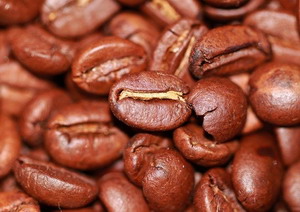 from the caffeine in the coffee is an obvious effect that is quite noticeable. Caffeine blocks the effects of adenosine, a chemical that slows down nerve impulses. As adenosine builds up over the course of the day it slows us down and relaxes us so we get tired and ready for
sleep. By blocking adenosine, nerve impulses speed uplifting our mood, metabolism, strength, memory, heart rate, and ability to focus. How quickly coffee's effects wear off depends on how well your liver breaks it down. On average it takes about 5 hours to remove half of the caffeine from the system, but this can vary greatly between people. This must be considered and felt individually so that you do not disrupt your sleep cycle.
from the caffeine in the coffee is an obvious effect that is quite noticeable. Caffeine blocks the effects of adenosine, a chemical that slows down nerve impulses. As adenosine builds up over the course of the day it slows us down and relaxes us so we get tired and ready for
sleep. By blocking adenosine, nerve impulses speed uplifting our mood, metabolism, strength, memory, heart rate, and ability to focus. How quickly coffee's effects wear off depends on how well your liver breaks it down. On average it takes about 5 hours to remove half of the caffeine from the system, but this can vary greatly between people. This must be considered and felt individually so that you do not disrupt your sleep cycle.
I don't like coffee, never have. I just don't like the taste. I have been trying to reproduce the effects of the Bulletproof coffee by using tea concentrate, so I can match the caffeine concentration. I mix the tea with the caprylic acid and the collagen and the butter and blend it up. This mixture has some positive  effects but does not produce the happy feeling that comes from the coffee. This morning I made up my tea version but also added some organic caffeine-free coffee crystals, and found the happy feeling was reproduced. So there is something in coffee other than caffeine that distinctly affects mood. Too bad coffee tastes bad to me. It works great for Ellen. It makes her happy for about two hours. I am still playing with this discovery
process.
effects but does not produce the happy feeling that comes from the coffee. This morning I made up my tea version but also added some organic caffeine-free coffee crystals, and found the happy feeling was reproduced. So there is something in coffee other than caffeine that distinctly affects mood. Too bad coffee tastes bad to me. It works great for Ellen. It makes her happy for about two hours. I am still playing with this discovery
process.
In the past, coffee developed a bad rap because people were overusing it. Too much coffee/caffeine obviously interferes with sleep and can increase blood pressure by raising the heart rate. More recent research, however, has shown that coffee decreases  all-cause mortality. That's right, drinking
coffee decreases your chances of dying from cancer, heart disease, diabetes, auto accidents, and a host of other causes. This is not about the caffeine as most of these same benefits are found when drinking decaf coffee (not the auto accidents.) There is some sort of magical stuff in coffee for humans – I just wish it tasted better.
all-cause mortality. That's right, drinking
coffee decreases your chances of dying from cancer, heart disease, diabetes, auto accidents, and a host of other causes. This is not about the caffeine as most of these same benefits are found when drinking decaf coffee (not the auto accidents.) There is some sort of magical stuff in coffee for humans – I just wish it tasted better.
Ellen has been enjoying just drinking a couple of cans of Bulletproof coffee each day (the type marketed by David Asprey.) It has really impressed her with how 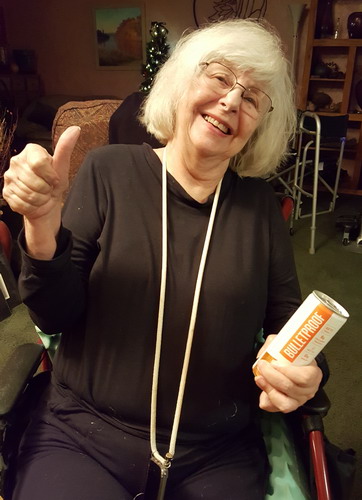 good she feels when taking it. I like how it affects her as well. She was concerned that she was becoming a drug addict from taking it, but I
think that it is more likely that it is supplying her with basic energy nutrition that she has been lacking. She has always drunk coffee, and it has never had this effect on her. The combination of all the components together seems to produce a synergistic effect.
good she feels when taking it. I like how it affects her as well. She was concerned that she was becoming a drug addict from taking it, but I
think that it is more likely that it is supplying her with basic energy nutrition that she has been lacking. She has always drunk coffee, and it has never had this effect on her. The combination of all the components together seems to produce a synergistic effect.
One of the issues heavily mentioned in the Aspery interview was the problem with mycotoxins. These are poisons created by mold. Many people are super sensitive to these poisons, and they appear in about 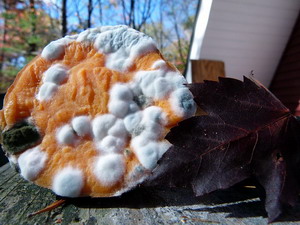 90% of the coffees on the market. That jittery feeling that coffee can give you is attributed to
reactions to mycotoxins. These toxins also appear in many other foods, like peanut butter and chili powder. So getting a good feeling probably requires using a toxin-free coffee. Organic coffee does not stop this, as the mold appears after the beans are harvested, during storage and transport. Roasting does not destroy these poisons. We have been buying the canned version of the Bulletproof coffee from Amazon. Link here
90% of the coffees on the market. That jittery feeling that coffee can give you is attributed to
reactions to mycotoxins. These toxins also appear in many other foods, like peanut butter and chili powder. So getting a good feeling probably requires using a toxin-free coffee. Organic coffee does not stop this, as the mold appears after the beans are harvested, during storage and transport. Roasting does not destroy these poisons. We have been buying the canned version of the Bulletproof coffee from Amazon. Link here
But you know me, why buy something when you can make it yourself is my motto. Start by making up a batch of mycotoxin-free coffee – cold brewed is best if you are going full tilt. Although, Ellen does not react to Mount Hagan instant organic coffee, so it probably is 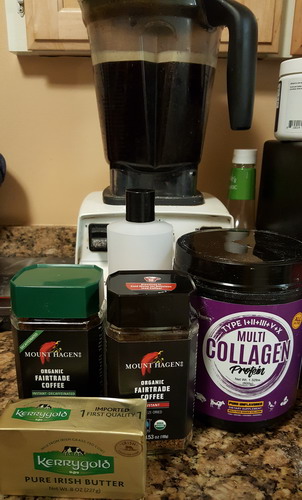 mycotoxin
free. Pour a 3/4ths full mug of this coffee hot into your blender. Add 1 tsp to 1 Tbs of the caprylic /capric acid oil into the coffee along with 1 scoop of collagen powder and ½ to 1 Tbs of grass-fed butter. If you like sweetener, use stevia or monk fruit. Blend this all on medium-high for a minute till it gets light and frothy. Pour and enjoy. We notice the effects within 10 minutes – see how you feel. Generally, the lift lasts for about 2
hours for us.
mycotoxin
free. Pour a 3/4ths full mug of this coffee hot into your blender. Add 1 tsp to 1 Tbs of the caprylic /capric acid oil into the coffee along with 1 scoop of collagen powder and ½ to 1 Tbs of grass-fed butter. If you like sweetener, use stevia or monk fruit. Blend this all on medium-high for a minute till it gets light and frothy. Pour and enjoy. We notice the effects within 10 minutes – see how you feel. Generally, the lift lasts for about 2
hours for us.
Considering the beneficial effects of coffee on general health and longevity, and the powerful benefits of the ketones from the caprylic/capric acid oil, plus the general benefit of collagen in supporting bone, skin, and tendon health, this brew appears to be quite a useful boost for our health. This is so much better if you actually like the taste of coffee. Then it becomes a pleasure as well as a health
aid. The trick is to not 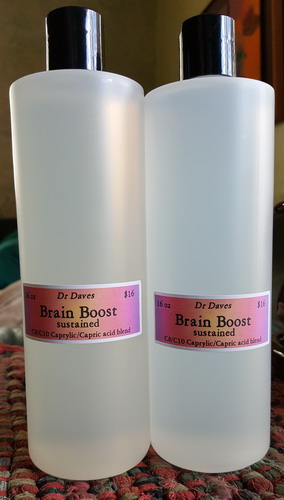 overdo it. A couple of mugs in the first half of the day should do nicely without messing with your sleep cycle. Most people already like their cup-o'-joe in the morning, and this just kicks that up about three notches. Give it a try and see what you think. I am going to make up some bottles of the caprylic/capric acid oil for
sale in the office. A 16-ounce bottle should be good for 32 to 50 servings and will be available for $16.
overdo it. A couple of mugs in the first half of the day should do nicely without messing with your sleep cycle. Most people already like their cup-o'-joe in the morning, and this just kicks that up about three notches. Give it a try and see what you think. I am going to make up some bottles of the caprylic/capric acid oil for
sale in the office. A 16-ounce bottle should be good for 32 to 50 servings and will be available for $16.
Take care,
David
There are only 15 copies left of the Good Job Journal at the office. These journals counter the constant stream of negative criticism we get from  others and ourselves. Just a minute each day spent jotting down what you did well during
the day helps you to see yourself in a whole new light. We are better than we give ourselves credit for, but we don't see it because we have been taught to ignore the good and focus on the bad. Unfortunately this robs us of the confidence to tackle life with zest and enthusiasm. Get your self transformation tool now for only $10.
others and ourselves. Just a minute each day spent jotting down what you did well during
the day helps you to see yourself in a whole new light. We are better than we give ourselves credit for, but we don't see it because we have been taught to ignore the good and focus on the bad. Unfortunately this robs us of the confidence to tackle life with zest and enthusiasm. Get your self transformation tool now for only $10.
We have received a third batch of  copies of my book The Balanced Life. They are available in the office for $17.99, and they are also
available on Amazon.com
copies of my book The Balanced Life. They are available in the office for $17.99, and they are also
available on Amazon.com
Ellen update:
Ellen is having a good time with her Bulletproof coffee, though she is doing just as well with the home brew version that I finally came up with.